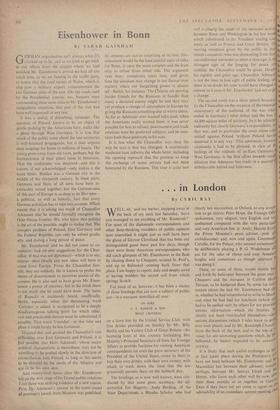Eisenhower in Bonn
By SARAH GAINHAM cracked up to he. and as we..tried to get back to our offices from the airpOrt where we had watched Mr. Eisenhower's arrival we had all too much time, as we sat fuming in the traffic jams, to notice that the road names at Wahn, which is also now a military airport, commemorate the lost German cities of the east. (On the roads used by the Presidential convoy, too, banners were commending these same cities to Mr. Eisenhower's sympathetic attention; that part of the visit had been well organised, at any rate.
It was a useful, if disturbing, reminder. The qUestion of Poland, known to be an object of gentle pushing by the Americans here, stalks like a ghost through West Germany. It is true that much of the public noise about the lost territories is well-financed propaganda, but it does express deep longings for home in millions of hearts. The young grow away from old roots, perhaps, but the homesickneSs of their elders turns to bitterness. That the misfortime was deserved—and this is known, if not acknowledged—only makes it the more bitter. Breslau was a German city in the middle of the thirteenth century. In these parts, Germans and Slays of all sorts have been in- extricably mixed. together, but the German-ness of this part of Europe is as,deep as its Slav-ness- a political, as well as historic, fact that every German politician has to take into account. Which means that it is asking too much of Chancellor Adenauer that he should formally recognise the Oder-Neisse frontier. We, who know that politics is the art of the possible, ought to realise that. The complex problem of Poland, East Germany and the Federal Republic can only be solved gradu- ally. and during a long period of peace.
Mr. Eisenhower said he did not come to co- ordinate: had no new suggestions for the,Chan- cellor. If that was not diplomacy—which is to say, untrue then clearly any .new ideas will have to come from Europe. From the Chancellor him- self, they are unlikely. He is known to prefer the theme of disarmament to narrower points of dis- cussion. He is also said to have given Mr. Eisen- hower a power of attorney, but in the finish there is not much else he could have done. The name of Rapacki is cautiously heard, unofficially. Berlin, especially when the threatening word 'Corridor' is added, is recognised to be a deeply disadvantageous talking point for which other, real and practicable themes must be substituted if possible. That word 'Corridor'—in this time and place it could hardly be less fortunate..
Granted this, and granted the Chancellor's real difficulties over East Germany and Poland, it is just possible that Herr • Adenauer, whose major political characteristic is shrewdness, may not be unwilling to be pushed slowly in the direction of reconciliation with Poland, as long as this seems to be dictated by the needs of the Alliance and not to be his own idea.
And twenty4our hours after Mr. Eisenhower left on the next stage of his Grand public-relations Tour there was striking evidence of a new course. First, Dr. Adenauer's answer to the latest round of postman's knock from Moscow was published. Its contents are not so surprising as. its tone. Dis- armament would be the least painful topic of talks for Bonn, at once the most complex and the least easy to refuse from either side. The argument runs thus: complexity takes time, and given time the situation may change in our favour over matters where our bargaining power is almost nil—Berlin, for instance. The Chinese are proving harder friends for the Russians to handle' than many a declared enemy might be and they may yet produce a change of atmosphere in Europe by giving the Russians something else to worry about. As far as Adehauer ever wanted talks (and, when the Americans really wanted them, it was never possible for him to refuse), disarmament and trade relations were his preferred subjects; and he men- tions both these positively in his note.
It is less what the Chancellor says than the way he says it that has changed. A courteously moderate tone informs the whole letter, including the opening reproach that the promise to keep the exchange of notes private had not been honoured by the Russians. This tone is quite new and is clearly the result of the intensive act; ■ between Bonn and Washington in the last N% eeki which culminated in the President visiting Get' many as well as France and Great Britain. I ht moving reception given by the public to their recent conqueror, who was demanding from dial unconditional surrender so short a time ago, is tW strongest sign of the longing for peace amt stability the Chancellor could be given. Despit' his rigidity and great age, Chancellor Adenauer is not the man to lose sight of public feeling, and there is no doubt his tone would have changed io answer to it even if Mr. Eisenhower had not urge a change.
The second event was a short speech broadcas by the Chancellor on the occasion of the twenties anniversary of the outbreak of the war which ended in Germany's total defeat and the loss of 44,000 square miles of territory. In it he admittc indirectly but clearly Germany's responsibility lof that war, and in particular the cruel crime coot' mitted against Poland 'without Poland ha via deserved it in any way.' This admission, however cautiously it had to be phrased, in view of tW feelings of the millions of ex-East Germans i West Germany, is the first effort towards recoil' ciliation that Adenauer has made in a quarrel of unbelievable hatred and bitterness. a


































 Previous page
Previous page